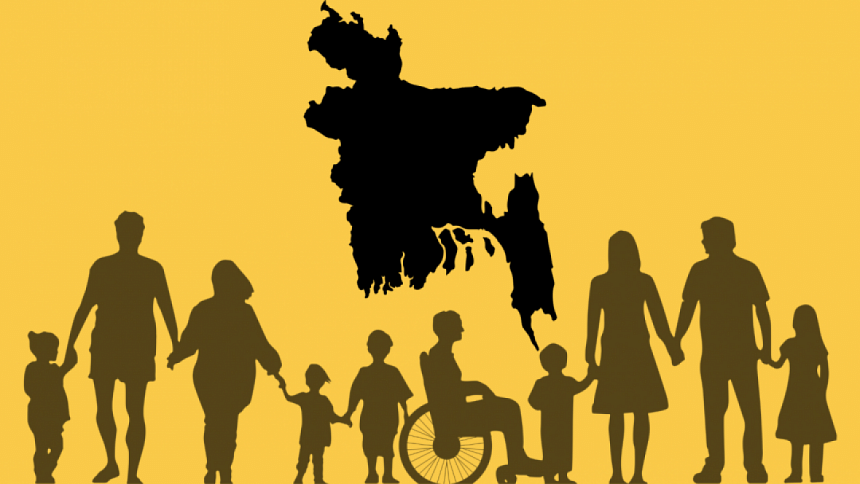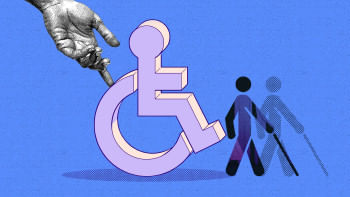Time for political parties to prioritise disability rights

In the wake of the historic July uprising, a new wave of hope and resistance surged across Bangladesh. It was not just a call for reform and justice, but also a cry for a country where equality is not aspirational but foundational. One year later, amid the chants of change, there lies a question we must not ignore: what place do the 16 million people with disabilities hold in Bangladesh's new vision for the future?
For far too long, persons with disabilities in Bangladesh have remained the most marginalised and invisible in the national development agenda. This invisibility is not due to their inability, but our failure as a society—more critically, failure in political leadership—to recognise and uphold their rights. As the country prepares for the upcoming national election, manifestos must reflect not just promises, but profound political will to ensure that disability rights are central to their vision of inclusive development.
Bangladesh, in a commendable display of commitment on paper, ratified the UN Convention on the Rights of Persons with Disabilities (CRPD) in 2007, thereby pledging to ensure the full realisation of rights for persons with disabilities. Subsequently, several legal and policy frameworks were introduced, including the Rights and Protection of Persons with Disabilities (RPPD) Act, 2013 and its accompanying national action plan on disability. These measures signify a shift from a welfare-based approach to a rights-based paradigm. This act recognises persons with disabilities as equal citizens, entitled to the same rights and protection under the law. However, despite its progressive legal framework, implementation remains slow, fragmented, and under-resourced, primarily due to the lack of strong political commitment.
While the Ministry of Social Welfare is the lead agency responsible for disability inclusion, it cannot act alone. Disability is a cross-cutting issue affecting all sectors—education, health, employment, infrastructure, governance—and thus demands inter-ministerial coordination. But the role of political parties is paramount. They are the architects of policy, the bearers of legislative power, and the shapers of public priorities. An election manifesto is a moral and political contract with the people. Therefore, inclusion of disability rights in manifestos is both a democratic necessity and a litmus test of a party's commitment to equality.
Ahead of the national election, the political parties must consider the following actions:
Legislative commitment: Every political party must pledge to enforce the RPPD Act. In this regard, the law must be updated to ensure that all government bodies are held accountable for their implementation.
Nomination of persons with disabilities: Representation matters. Political parties must commit to nominating qualified persons with disabilities as candidates for parliamentary and local elections to demonstrate their true potential. Their presence in decision-making bodies is crucial for disability-inclusive governance.
Establishing disability focal points: Every political party should establish a dedicated disability focal point to coordinate inclusion efforts, both during the election campaign period and beyond.
Formation of a parliamentary caucus on disability: Commit to establishing an all-party parliamentary caucus on disability. This caucus should be empowered to monitor policy implementation, influence legislation, and ensure that disability issues remain on the parliamentary agenda.
Adequate resource allocation: Manifestos must commit to allocating adequate financial and human resources for disability inclusion. This includes funding for accessible infrastructure, inclusive education, assistive technologies, and community-based rehabilitation.
Capacity-building for political leaders: Top leadership within political parties must undergo orientation sessions and include mandatory disability inclusion training in their party development modules. Understanding rights is the first step towards ensuring them.
Universal accessibility: Political parties must pledge to uphold accessibility standards across public infrastructure, schools, hospitals, and transportation systems. The universal design principle should guide all future development plans.
Awareness and sensitisation: Combating stigma and discrimination requires consistent public awareness campaigns. Political parties must commit to public education initiatives that promote the rights and dignity of persons with disabilities.
Strengthening institutional mechanisms: The national executive committee, the national coordination committee, and the district disability committees outlined in the RPPD Act must be reactivated. Ministries should appoint disability focal points with clear roles, responsibilities, and accountability mechanisms.
Engagement with civil society: Disability advocacy groups and organisations of persons with disabilities are the voice of the community. Political parties should consult them on developing and implementing policies related to disability.
Accessible campaigning: Political campaigns themselves must be inclusive. Rallies, debates, manifestos, websites, and social media content must be accessible to people with diverse disabilities. Inclusion starts with how parties communicate their vision.
Work with Election Commission: Political parties play a significant role in the conduct of a smooth, free and fair election with the Election Commission (EC). Therefore, they must collaborate with the EC to ensure people with disabilities can enjoy their voting rights independently.
The July uprising of 2024 ignited a national conversation around injustice, economic disparity, and democratic accountability. If this spirit of reform does not translate into tangible gains for the marginalised—including persons with disabilities—then the movement's legacy will remain incomplete. It is time for our political parties to demonstrate leadership in ensuring inclusivity in all aspects of society. Let their election manifestos be the starting point of transformation.
Ayon Debnath is a development practitioner currently working with Sightsavers as campaign adviser.
Views expressed in this article are the author's own.
Follow The Daily Star Opinion on Facebook for the latest opinions, commentaries and analyses by experts and professionals. To contribute your article or letter to The Daily Star Opinion, see our guidelines for submission.

 For all latest news, follow The Daily Star's Google News channel.
For all latest news, follow The Daily Star's Google News channel. 





Comments